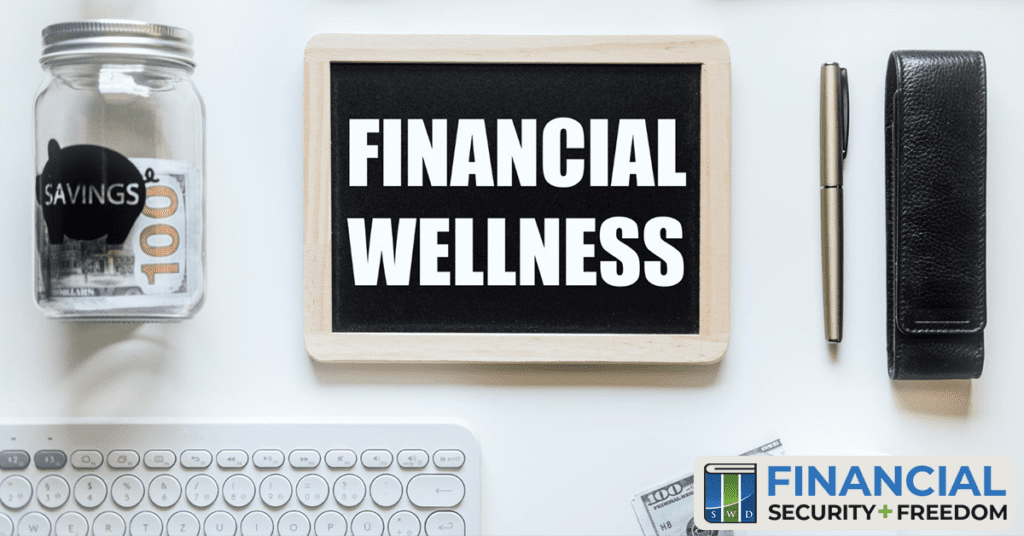
Key Takeaways
- A new year can be a good time to review your financial situation and goals. A Financial Advisor can help you get organized and look forward.
- Know what you’re working for, ask where you’re going, set goals for this year and beyond.
- Review everything from beneficiaries on old plans to current insurance needs to financial solutions that may no longer fit. There’s no set and forget. Money never sleeps.
Why now?
The start of a new year marks a traditional point to reflect on the prior 12 months, but more importantly the opportunity to focus on the new – set goals, establish new habits, and focus on what’s important. We can’t change the past, but we can take charge of our future.
January is Financial Wellness Month. It’s a good time to review what changed in the past year: a new house, a new baby, marriage or divorce. And looking ahead, where do you want to be, and are you on track? As the calendar turns, we’re all a little closer to mileposts that once seemed far off: college for the kids; a wedding; a new baby; even retirement.1
Financial wellness doesn’t happen by accident. It takes mindfulness, consistency, commitment (and maybe a little help from a Financial Advisor). It’s OK to feel overwhelmed. But if you’re a successful professional, you already know how to take on big tasks – a little at a time – and see them through.
A recent study found 77% of Americans say they’re anxious about their financial situation. Nearly 60% feel finances control their life, and 68% say they’re concerned they won’t have saved enough for retirement. Look over your financial picture and take control.2
Taking Stock
Know where you stand.
Dig into your finances, get the big picture about not only how much you earn, but also how much you save – and where. Just as important as saving is spending. Are credit cards out of control? Spending more than you make can be a problem, even for high earners. Use what you learn to make a budget. A 2022 report found more than a third of Americans making $100,000 or more are living paycheck to paycheck. That’s got to stop.3
Check your emergency fund.
If you have one, make sure it’s adequate, and if you don’t, set one up. The Federal Reserve says nearly a third of Americans couldn’t pay an unexpected $400 bill without borrowing or selling something. Many recommend setting aside three to six months of earnings in case of emergencies such as loss of employment, illness, even damage to your home, auto, or appliances.4,5
Healthcare and savings.
Speaking of emergencies, nobody has to tell you how expensive healthcare is. Some 20% of Americans struggle with medical debt, including people with insurance. High-deductible plans, out-of-network doctors, prescriptions, they add up. But there is help. If you’re eligible, a Health Savings Account (HSA) can help you save for medical care in a tax-advantaged account. You can even invest those savings. Or you could manage healthcare spending you know you’ll use during the year in a Flexible Spending Account, setting aside a little to spend as you go (be careful, you’ll need to use this during the year, and there are multiple types of FSAs). A savvy Advisor can explain.6,7
Taking Steps
What do you want?
You can’t get there without knowing where “there” is. Make a list. Write it down. A new home? Early retirement? A sabbatical? A new baby? Talk with your family and understand where you’re going as a team. Maybe a vacation home isn’t as important right now as beefing up retirement investments. Maybe the kids need a college savings plan more than an expensive private elementary school. It’s OK to talk about money. How do you start? You just start. Talk.8
Get organized.
Nobody said this was easy. But it can be hard to make progress if you’ve got a long-lost retirement account from an old job somewhere, investments with multiple companies, and you don’t know if you’re eligible for, or need, an IRA, HSA, FSA, 529 college plan. Organize tax and business expenses.
Student loans (yours and your kids’).
You’ve probably heard plenty about student loan initiatives in 2022. It can be confusing, but don’t ignore the issue. If you have loans, ask if you’re missing anything that could help pay them down. If you have children, what’s your plan for their financial college needs? 9
Review your investments.
Financial conditions change yearly, just as you change. You can meet with your financial pro to see how you’re doing. If you’re significantly older than you were when you set things up, maybe your risk tolerance has shifted. Maybe you’ve outgrown a term life policy and could put that money to work elsewhere. Maybe an annuity is intriguing. If you don’t know, ask if you are taking full advantage of new retirement savings limits. And if you’re approaching ages 50, 55, 59½, 62, or 73, ask if these age milestones affect your situation. Don’t forget, if you’ve recently been the beneficiary of a retirement account, those inherited investments may not be perfect for your situation, and the rules for distribution have changed.10
The Bottom Line Is …
Your Bottom Line
We all know money can be confusing and maybe uncomfortable to talk about. Tackling the really big, important goals can be intimidating. But setting and forgetting it isn’t the answer. You don’t just hope for the best, you work for the best. January’s national recognition of Financial Wellness Month is a good conversation starter. Talking with a Financial Advisor can help, and bring your questions, that’s what they’re there for. You may even ask if you need extra help such as an accountant, an insurance consultant, or, if needed, a lawyer.
Go top to bottom through your financial picture. What would happen if the unexpected happens, such as a disability, an illness, or we hope not, a death in the family. Is your estate plan current. And by all means, check your beneficiaries on anything that could be passed on, such as an insurance policy or a retirement account or pension. You probably don’t want to leave your ex a windfall should you pass on unexpected (a beneficiary usually trumps a will, and the named beneficiary gets the spoils.)10
If you’re investing and saving, you’re probably a smart person. But that doesn’t mean you know everything. You don’t know what you don’t know. But someone does. Ask.
Feeling good about your financial acumen? The Financial Industry Regulatory Authority – FINRA – has a free online quiz. Give it a try.
Resources for Financial Wellness:
We’ve compiled checklists that help you assess where you are in your financial journey, where you could improve, and provide topics of conversations to have with your Financial Advisor.
-
Goal setting: Master list of goals
-
What issues should I consider at the start of the year?
-
What issues should I consider when paying off my student loans?
-
What issues should I consider when reviewing cash flow?
-
What issues should I consider when reviewing my investments?
Sources:
- “Consumer Expert: January Is The Best Month To Realign Your Financial Goals For The Year,” KAGS-TV, Sara Wilson, Matthew Gromala, Jan. 10, 2023 https://www.kagstv.com/article/money/financial-wellness-month-resetting-financial-clock/499-61057268-64ed-42cf-9f09-0ab6cb4697e3
- 2. “77% of Americans are anxious about their financial situation—here’s how to take control,” CNBC, Alexandria White, Dec. 29, 2022 https://www.capitalone.com/about/newsroom/mind-over-money-survey/
- “Amid High Inflation, 36% Of Employees Earning $100,000 Or More Say They Are Living Paycheck To Paycheck,” CNBC, Greg Iacurci, Jun. 17, 2022 https://www.cnbc.com/2022/06/16/more-high-earners-are-living-paycheck-to-paycheck.html
- 4. “Economic Well-Being of U.S. Households (SHED),” Federal Reserve, May, 2022 https://www.federalreserve.gov/publications/2022-economic-well-being-of-us-households-in-2021-dealing-with-unexpected-expenses.htm
- “5 Steps to Build an Emergency Fund,” Experian, Evelyn Waugh, Oct. 29, 2022 https://www.experian.com/blogs/ask-experian/how-to-build-an-emergency-fund/
- “1 In 5 Households Has Medical Debt. That Includes People With Private Insurance,” NBC News, Berkely Lovelace Jr., Sep. 16, 2022 https://www.nbcnews.com/health/health-news/1-5-households-medical-debt-includes-people-private-insurance-rcna48076
- 7. “Health Care FSA Vs. HSA—Understanding The Differences,” Forbes, Kemberley Washington, Oct. 26, 2022 https://www.forbes.com/advisor/taxes/healthcare-fsa-vs-hsa/
- “How to Talk About Money,” New York Times, Carl Richards, undated, accessed Jan. 2023 https://www.nytimes.com/guides/year-of-living-better/how-to-talk-about-money
- 9. “The Most Popular Federal Student Loan Programs: Find Out What You Qualify For,” The Balance, Christy Rakoczy, Sep. 28, 2022 https://www.thebalancemoney.com/the-3-most-popular-federal-student-loan-programs-795125
- 10. “5 Things to Know About Asset Allocation,” Motley Fool, Catherine Brock, Dec. 16, 2022 https://www.fool.com/retirement/strategies/asset-allocation-by-age/
11.“The Importance of Updating Retirement Account Beneficiaries,” Investopedia, Staff, Apr. 29, 2022 https://www.investopedia.com/retirement/importance-updating-retirement-account-beneficiaries/
